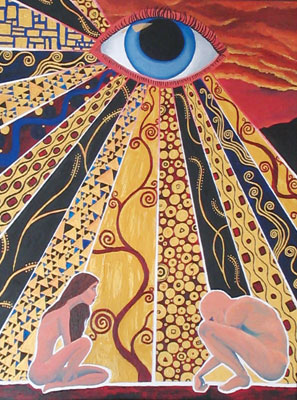All Nonfiction
- Bullying
- Books
- Academic
- Author Interviews
- Celebrity interviews
- College Articles
- College Essays
- Educator of the Year
- Heroes
- Interviews
- Memoir
- Personal Experience
- Sports
- Travel & Culture
All Opinions
- Bullying
- Current Events / Politics
- Discrimination
- Drugs / Alcohol / Smoking
- Entertainment / Celebrities
- Environment
- Love / Relationships
- Movies / Music / TV
- Pop Culture / Trends
- School / College
- Social Issues / Civics
- Spirituality / Religion
- Sports / Hobbies
All Hot Topics
- Bullying
- Community Service
- Environment
- Health
- Letters to the Editor
- Pride & Prejudice
- What Matters
- Back
Summer Guide
- Program Links
- Program Reviews
- Back
College Guide
- College Links
- College Reviews
- College Essays
- College Articles
- Back
Religion, India and Me
In a community where a day begins with the bellowing call for Adhan and ends with the tinkling of temple bells and the blowing of conch shells, it certainly turns a few heads when you declare you do not have faith in any god. Guide books, calendars, picture postcards that try to depict the 'essence' of India are almost inevitably decorated with photographs of Indian deities or quotations from religious texts. India has a population of 6 billion, and each of these 6 billion people corresponds to one or the other religions of India. This fervently spiritual crowd maybe classified under 8 major heads- Hindus, Muslims, Sikhs, Jains, Buddhists, Christians, Parsees and Jews.
However, the purpose of this article is not to elaborate the spiritual background of India, it is to explain why, brought up in such ardently religious conditions, I chose to be an atheist.
I was born to a Hindu family, descendants of the Brahmins (he priests) of the olden days. In fact, our family tree traces its branches to Shri Chaitanya, one of the leading proponents of the Bhakti movement, which took place in India between the 14th and the 17th centuries. The bhakti movement was a reformist movement in Hinduism, objecting to the rituals and superstition that had corrupted the religion that had been formed over 3,000 years ago from now. The movement protested against idol worship, corruption among the priests, and preached that it is only love and respect (‘bhakti’) that can connect a person with god. Also, for the first time in Hinduism, it preached monotheism. But the modern thinkers of that time, which included Chaitanya, and their works, were defeated in their own aim. Now, it is Chaitanya himself who idols are worshipped in temples. How ironic is that!
So stories of Chaitanya, parables and Hindu mythology have been a part of my growing up. My father, with his knowledge of Sanskrit, and thoroughness of the Vedas, the Puranas, and of course, the two epics- the Ramayan and the Mahabharat, told me various stories as a child, which found in me a rapt listener. As I grew older, instead of becoming a Hindu, as the rest of my family is, I decided that I did not believe in god. Of course, there are awkward moments, especially during religious festivals like the Durga Pujo, when I refuse to join my hands in front of a clay deity draped in a gaudy golden saree.
Let me rephrase my “religious orientation”. I don’t ‘not believe in god’, rather, I ‘believe in people’. I see religious people around me all the time. Say for instance, the lady who comes to clean our house. She may not have the means to feed her entire family, but she would rather offer the most beautiful dishes and garments to a lifeless idol. Or for example, the Durga Pujo that Kolkata celebrates every year. Millions of rupees go into the building of pandals, idols, and payments for priests, sweets, and flowers. All for that wonderful deity, who in her clay form, having eaten more than Kolkata’s hungry street children, is surely blessing these people for going hungry and feeding her instead. If only the same money had gone into the spread of education, India would have a better future awaiting her.
These people tend to ignore the contribution that doctors and teachers, scientists and engineers make towards the betterment of their lifestyles. When I see the banks of the Ganga at Haridwar, the sight of the teeming hungry no longer brings tears to my eyes. Now when the newspaper reports reveal stampedes at the Kumbhmela every year. Nor when the elderly and the infirm are forced on the buses leaving for pilgrimages- most likely, not to return. They’re died serving god, and that is what matters, isn’t it? Isn’t it? I wonder what vindictive and selfish god it is, who pleasures to see her subjects suffer so much.
It is India who has chosen to be thus- it is she herself who refuses to let herself be rescued from the tower of superstition where she still is a prisoner. It is she who continues to believe that someday, a god will save her from this misery. So she waits.

Similar Articles
JOIN THE DISCUSSION
This article has 4 comments.
There have been more than enough discussions on this point, and I have no desire to waste my time or effort arguing with people who refuse to open their eyes.
I have better things to do- as serving humanity...since 'god' does not seem to be doing a very good job.

2 articles 0 photos 2 comments